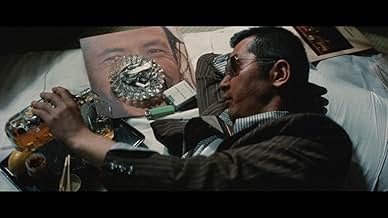There’s something about the Noir genre that always entices. Perhaps it’s the romanticisation of cold, silent gentlemen who aren’t afraid to play dirty (who, in any other situation would be treated as thugs or creeps). Perhaps it’s the more pessimistic look, displaying the world around us as one of sin and parasitic pleasure. Or maybe it’s the slow degradation of the perfect hero, watching as their values and ideas they’ve held close all their life are revealed to be meaningless and they start to form their true self.
Yakuza films date back to the 1920s, in the middle of silent cinema. Back then, the characters were portrayed as admirable heroes forced into a life of lawlessness but desperate to return to a more peaceful life. However, after the end of World War 2, the cinematic image of Yakuza became darker with the development of the Jitsuroku genre (translated to “actual record films”) based on the real-life activity of Japanese crime syndicates. From this genre, ‘Yakuza Graveyard’ was developed and, I believe, successfully blended to create an amazing piece of Japanese Noir.
Kuroiwa is a cop operating in Osaka after a history of rule-breaking. As the Nishida and Yamashiro crime families get closer and closer to a full-scale turf war, Kuroiwa is dropped right in the middle, forced to play both sides in order to bring an end to gang violence. However, as he begins a relationship with the Nishida underboss Keiko and uncovers criminal corruption in the police force, he questions who he should be and decides where his loyalty truly lies.
Tetsuya Watari plays Kuroiwa with such a dirty suaveness. You know you should by all counts hate the guy, but seeing him strut down the Osaka streets with shades on while dangling a lit cigarette between his lips can’t help but make you want to emulate him. His calm monotone voice is the perfect finisher for a corrupt cop trying to do right by any means necessary. You may recognise his voice as the very same for Shintaro Kazama in the ‘Yakuza’ video game series.
Tatsuo Umemiya plays Iwata, the acting boss of the Nishida family, and absolutely dominates each of his scenes. His aggressive strut and commanding voice portray the character as a titan, and because of this, he makes Iwata feel like the perfect Yin to Kuroiwa’s Yang. The pair both exuding such masculine and uncaring energy make me firmly believe in another universe, the two could have had a better fate together, maybe as police partners or as bosses of their own syndicate.
Meiko Kaji plays Keiko as the perfect noir damsel. Her melodramatic acting perfectly matches her character’s backstory. Her best scene is undoubtedly the second-to-last in the film. Her attempt at revenge before breaking down in tears and readying a syringe filled with heroin is heartbreaking and poetic. She feels like the kind of dame Humphrey Bogart would comfort.
The film is shot with a beautiful cold blue colour palette. The film feels ‘Finchian’ visually, with a constant dark tone only accentuated by its shaky camera. Despite being made in 1976, this could easily pass as a 2000s thriller, the film’s cinematography feels very modern. I feel the best scene from a cinematography point of view is the flashback to Kuroiwa killing a yakuza before taking his widow as a lover a few weeks later. The intense following of the yakuza escaping before falling to his death dazzled me. It was claustrophobic, it was adventurous, it felt slightly anti-climactic as his corpse came into view, I half-expected a chase scene across the rooftops.
It’s no surprise ‘Yakuza Graveyard’ is highly regarded as one of the best of Yakuza films of all time, especially with a director like Kinji Fukasaku at the helm. 3 years before ‘Graveyard’, he had already proved himself a legend in the genre with ‘Battles Without Honor And Humanity’ and would later direct his much more well-known masterpiece ‘Battle Royale’
Mason’s Top 3 Reasons to Watch ‘Yakuza Graveyard’
- An action movie protagonist that could rival Dirty Harry, Martin Riggs or John McClane
- Noir subplots that will keep you hooked and make you question your morality
- Breathtaking visuals that put 70s thrillers like ‘Taxi Driver’ and ‘The Conversation’ to shame




